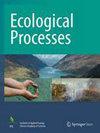外来树种女贞对乌拉圭亚热带原生林的入侵过程:建立和主导地位的决定因素
IF 3.9
2区 环境科学与生态学
Q1 ECOLOGY
引用次数: 0
摘要
哪些因素、过程和机制调节入侵过程及其影响?这是生物入侵生态学研究的主要问题之一。女贞(Ligustrum lucidum)是一种原产于东亚的树种,现已成为世界各地亚热带和温带森林的侵略性入侵者。我们在此分析了女贞在乌拉圭森林中的入侵情况,以确定控制入侵过程中两个阶段(建立阶段和优势阶段)的因素。通过在1525个1×1千米的小区中测量发生率来评估其建立情况,通过在5554个1×1千米的小区中遥测L. lucidum在林冠的覆盖率来评估其优势。利用广义线性模型对发生率和优势度进行建模,并与独立的环境和地理变量进行函数分析。13.4% 的乌拉圭森林中已经出现了女贞,1.2% 的森林中女贞占据了林冠。我们的模型分别解释了45%和35%的出现率和优势率空间变异,并在这两种情况下发现了从西南部地区向乌拉圭其他地区的强烈扩散模式。出现率主要随着城市地区的功能以及与城镇的接近程度而增加,这可能是因为种植在花园中的栗树是种子来源,而且铁路和高速公路附近也可以起到生物走廊的作用。壤土和河流附近的出现率也有所增加,这表明湿度条件有利于其生长。在森林面积减少、高产土壤和海拔较高的地方,优势度增加。此外,在城市地区、公路和铁路附近、植树造林程度较高的地区以及壤土和低岩石含量的土壤中,该物种的优势度也有所提高。L.Lucidum对乌拉圭森林的入侵正处于扩散和影响阶段,目前正从最古老的城市化地区--西南部地区向乌拉圭其他地区扩展。目前,与入侵中心的地理位置接近程度是预测露卡菌建立和占据优势的主要因素。此外,人类基础设施改善了传播压力和分散性,这在很大程度上促进了萤火虫的建立,但在小块或破碎的森林、富含营养的土壤和高海拔地区,萤火虫的优势会增强,这表明生态系统的抵抗力也在起作用。本文章由计算机程序翻译,如有差异,请以英文原文为准。
Disentangling the invasion process of subtropical native forests of Uruguay by the exotic tree Ligustrum lucidum: establishment and dominance determinants
What factors, processes and mechanisms regulate invasive processes and their effects? This is one of the main questions addressed by the ecology of biological invasions. Ligustrum lucidum, a tree species native to East Asia, became an aggressive invader of subtropical and temperate forests around the world. We analyzed here the L. lucidum invasion in Uruguayan forests to determine the factors controlling two stages of the invasive process, the establishment, and the dominance. Establishment was assessed by the occurrence, measured in 1525, 1 × 1 km-cells, and dominance by remotely measuring the L. lucidum coverage at the forest canopy in 5554, 1 × 1 km-cells. The occurrence and dominance were modeled using Generalized Linear Models in function of independent environmental and geographic variables. Ligustrum lucidum has become established in 13.4% of the Uruguayan forests and has dominated the forest canopy in 1.2%. Our models explained 45% and 35% of the occurrence and dominance spatial variance respectively and detected in both cases strong diffusion patterns from the S-SW region to rest of Uruguay. Occurrence increased mainly in function of urban areas, and with the proximity to towns, probably because L. lucidum trees planted in gardens are seed sources, and near railways and highways, that could function as biological corridors. Occurrence also increased in loamy soils and near rivers, suggesting moisture conditions are favorable for establishment. Dominance increased with reduced forest area, in high productive soils and at higher altitudes. Moreover, dominance increased near urban areas, roads, and railways, as well as in highly afforested landscapes, and in loamy and low-rockiness soils. The invasion of Uruguayan forests by L. lucidum is in the spread and impact stages, currently in expansion from the invasion focus on the S-SW region, where the oldest urbanizations are settled, towards the rest of the country. The geographic proximity to the invasion focus is currently the main predictor of both L. lucidum establishment and dominance. Additionally, whereas establishment is manly facilitated by human infrastructures improving propagule pressure and dispersion, dominance is enhanced in small or fragmented forest patches, in rich-nutrient soils, and at higher altitudes, suggesting ecosystem resistance is also operating.
求助全文
通过发布文献求助,成功后即可免费获取论文全文。
去求助
来源期刊

Ecological Processes
Environmental Science-Ecological Modeling
CiteScore
8.50
自引率
4.20%
发文量
64
审稿时长
13 weeks
期刊介绍:
Ecological Processes is an international, peer-reviewed, open access journal devoted to quality publications in ecological studies with a focus on the underlying processes responsible for the dynamics and functions of ecological systems at multiple spatial and temporal scales. The journal welcomes manuscripts on techniques, approaches, concepts, models, reviews, syntheses, short communications and applied research for advancing our knowledge and capability toward sustainability of ecosystems and the environment. Integrations of ecological and socio-economic processes are strongly encouraged.
 求助内容:
求助内容: 应助结果提醒方式:
应助结果提醒方式:


